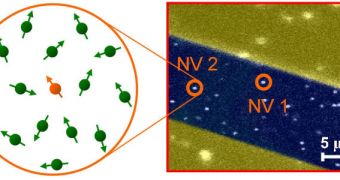A team of investigators managed to achieve an impressive breakthrough recently, when they developed a method of preserving the spin state of a single electron inside its environment.
In other words, the physicists were able to allow for the separate existence of a single solid state spin in a quantum bit, or qubit.
These constructs are the building blocks for new quantum technologies, such as quantum computer. Researchers have been trying to obtain such devices for years, but the work proves extremely complex.
Producing stable qubits is one of the most difficult aspects of such research, which is why the new accomplishment is so important to the field.
Generally, ultracold beryllium atoms are used for the job, and they are kept in a matrix of electric and magnetic fields. But the qubits which are produced in this manner do not remain stable for very long.
Now, experts in the Netherlands, at th Delft University of Technology (TU Delft) and the United States, at the Ames Lab, have developed a new strategy for protecting spin states in single electrons.
The interactions qubits have with their environment are the main cause of their failure, physicists argue. As such, limiting or controlling these exchanges have become a primary objective in quantum physics research.
The international collaboration accounted for these effects by “flipping” the spin state of a single electron in a mix via the use of an extremely short laser pulse.
This allows the electron's spin to become decoupled from its environment, therefore reducing external influences on the qubit to a great extent.
The technology was proven functional for most spin states, the researchers say, which means that another major obstacle in the path of quantum computers has been eliminated.
Details of the new work were published in the latest online issue of the top journal Science. The investigation was supported by grant money from FOM, and the now.
Additional funds were provided by the US Defense Advanced Research Projects Agency (DARPA).
The main thing that differentiates a qubit from a regular bit is the fact that it can exist in many states at the same time.
While an average computer bit can only take on one of two values (1 or 0), a quantum bit can be a 1, a 0, or a 1 and 0 at the same time.
This will enable quantum computers to crack complex codes, or make sense of computationally-intensive problems with relative ease.

 14 DAY TRIAL //
14 DAY TRIAL //